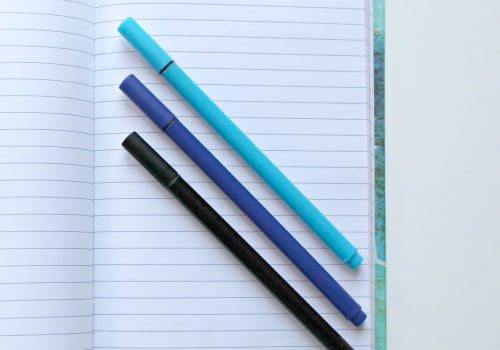Preparing for a test can be one of the most daunting tasks for any student. It requires a lot of hard work, dedication, and careful planning. To help you make the most of your test preparation, we've compiled some of the best strategies available on The Best Tutoring Websites. From studying smarter to staying organized and motivated, these strategies can help you maximize your test-taking performance and give you the confidence you need to ace any test!The first step in preparing for any test is to develop a study plan.This should include a timeline of when you will review specific topics, as well as how you will review them.
It is also important to set goals and rewards to motivate yourself. Additionally, it is helpful to break down complex topics into smaller, more manageable chunks. Next, you should create a study environment that is conducive to learning. This should be free of distractions and comfortable enough that you can focus on your studies.
You should also make sure that you have all the materials you need, such as textbooks, notes, and online resources. It is also important to practice test-taking techniques. This includes reading questions carefully, answering questions quickly, and managing your time effectively. If you feel overwhelmed during the test, it can be helpful to take a few deep breaths or take a short break.
Additionally, it is important to get plenty of rest and eat healthy meals before the test. Finally, it is important to manage stress and anxiety when preparing for tests. This can be done by setting realistic expectations and focusing on what you can control. Taking breaks throughout the day and engaging in physical activity can also help reduce stress levels. Additionally, talking to friends or family members about your concerns can help you work through any worries or doubts that you may have.
Managing Stress and Anxiety
Test preparation can be a stressful time for any student.It is important to remember that there are various strategies to help manage stress and anxiety associated with test preparation. One of the most effective strategies is to set realistic expectations. This means having a realistic idea of what you can achieve in the time you have available and what type of results you can expect. Another way to manage stress and anxiety during test preparation is to engage in physical activity. This could include going for a walk, running, biking, or even yoga.
Physical activity releases endorphins, which can help reduce stress and anxiety levels. Additionally, it can help clear your mind and give you more focus and energy to study.
Managing stress and anxiety during test preparation is essential for achieving educational success.
Setting realistic expectations and engaging in physical activity are two great ways to do this. By implementing these strategies, you can better prepare yourself for tests and maximize your chances of success.Practicing Test-Taking Techniques
Test-taking techniques can be an important factor in achieving educational success. Reading questions carefully, answering quickly, and managing time effectively are all essential skills to help improve your test performance.When reading a test question, it is important to read it carefully and understand what it is asking. Take the time to read all of the information provided for each question and identify any possible keywords that can help you answer it. It is also important to double-check that your answer is correct before submitting it. In addition to reading questions carefully, answering quickly is also important when taking a test.
Although there is no need to rush, answering questions quickly helps save time and allows you to answer more questions in the allotted time frame. To help with this, practice answering questions quickly and accurately by using practice tests or taking practice exams. Finally, managing your time effectively during a test is key to success. Make sure to budget your time wisely and prioritize the questions that you think are the most important or difficult.
You can also use strategies such as skipping difficult questions and coming back to them later if you have extra time. By following these test-taking techniques, you will be able to prepare more effectively for tests and increase your chances of success.
Developing a Study Plan
Creating an effective study plan is essential for achieving success on tests. When developing a study plan, it's important to create a timeline for studying and set achievable goals.This will help you stay motivated and organized. Additionally, you may want to consider setting rewards for yourself when you reach certain goals. When setting up a study plan, think about what kind of learner you are and the best way for you to absorb and retain information. If you're a visual learner, use charts and diagrams to help you understand difficult concepts.
If you are more of an auditory learner, consider listening to lectures or audio recordings of lessons. It's also important to consider how much time you will need to devote to studying each day or each week. If your test is coming up soon, you may need to put in more time than if the test was further away. Make sure that you plan your study sessions in advance so that you can manage your time effectively.
Finally, it's important to take regular breaks throughout your study sessions. This will help keep your energy levels up and allow you to focus on the material more effectively.
Creating a Study Environment
Creating an environment free of distractions and having all the materials you need can help you maximize your study time and increase your focus. To create a study environment that best fits your needs, consider the following:LocationWhen selecting a place to study, look for a space that is comfortable, quiet, and well-lit.If possible, find somewhere that is free from distractions such as phones and televisions. If you are unable to find a location that meets these criteria, try using noise-cancelling headphones or white noise to drown out any potential distractions. Additionally, make sure that you have access to the resources you need such as textbooks, notes, and other materials.
Schedule
Creating a study schedule can help you stay organized and focused on your studies. Make sure to set aside enough time each day to review the material and complete your assignments.Additionally, designate certain times for breaks and make sure to stick to them. Taking regular breaks can help you stay focused and motivated.
Organization
Having all the materials you need for studying organized and easily accessible can help you maximize your study time. Create a designated spot for studying and make sure to keep your materials there. Additionally, create an organized filing system for notes, handouts, and other materials so that you can quickly find what you need.Test preparation is essential for educational success, and following the strategies outlined in this article can be incredibly beneficial. Developing a study plan, creating a study environment, practicing test-taking techniques, and managing stress and anxiety are all key components of successful test preparation. With these tips and techniques, you can improve your study habits and maximize your test performance.







